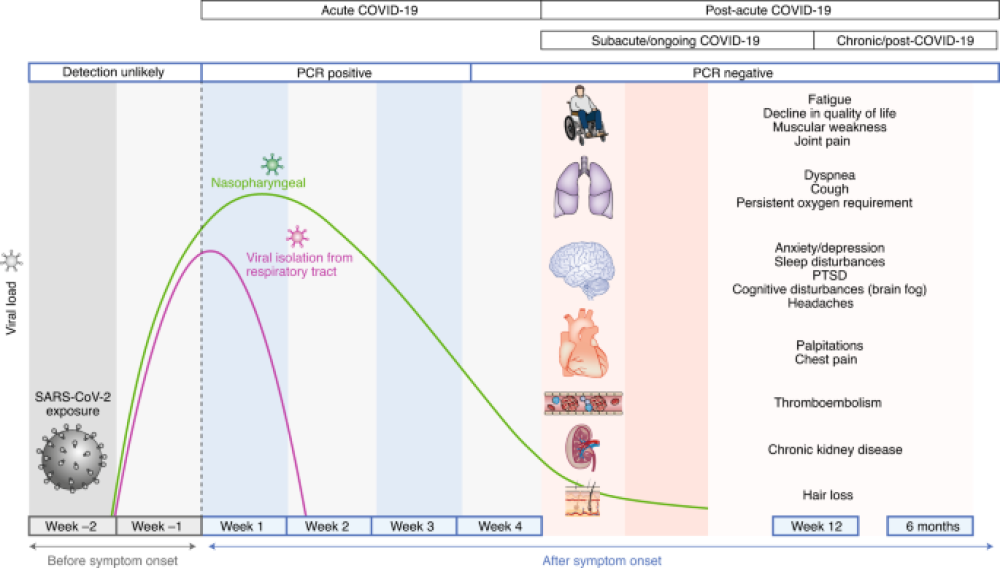- Authors: Ani Nalbandian, Kartik Sehgal, Elaine Y. Wan Nature Medicine volume 27, pages601–615 (2021)
Abstract
Severe acute respiratory syndrome coronavirus 2 (SARS-CoV-2) is the pathogen responsible for the coronavirus disease 2019 (COVID-19) pandemic, which has resulted in global healthcare crises and strained health resources. As the population of patients recovering from COVID-19 grows, it is paramount to establish an understanding of the healthcare issues surrounding them. COVID-19 is now recognized as a multi-organ disease with a broad spectrum of manifestations. Similarly to post-acute viral syndromes described in survivors of other virulent coronavirus epidemics, there are increasing reports of persistent and prolonged effects after acute COVID-19. Patient advocacy groups, many members of which identify themselves as long haulers, have helped contribute to the recognition of post-acute COVID-19, a syndrome characterized by persistent symptoms and/or delayed or long-term complications beyond 4 weeks from the onset of symptoms. Here, we provide a comprehensive review of the current literature on post-acute COVID-19, its pathophysiology and its organ-specific sequelae. Finally, we discuss relevant considerations for the multidisciplinary care of COVID-19 survivors and propose a framework for the identification of those at high risk for post-acute COVID-19 and their coordinated management through dedicated COVID-19 clinics.
Main
Severe acute respiratory syndrome coronavirus 2 (SARS-CoV-2), the pathogen responsible for coronavirus disease 2019 (COVID-19), has caused morbidity and mortality at an unprecedented scale globally1. Scientific and clinical evidence is evolving on the subacute and long-term effects of COVID-19, which can affect multiple organ systems2. Early reports suggest residual effects of SARS-CoV-2 infection, such as fatigue, dyspnea, chest pain, cognitive disturbances, arthralgia and decline in quality of life3,4,5. Cellular damage, a robust innate immune response with inflammatory cytokine production, and a pro-coagulant state induced by SARS-CoV-2 infection may contribute to these sequelae6,7,8. Survivors of previous coronavirus infections, including the SARS epidemic of 2003 and the Middle East respiratory syndrome (MERS) outbreak of 2012, have demonstrated a similar constellation of persistent symptoms, reinforcing concern for clinically significant sequelae of COVID-19 (refs. 9,10,11,12,13,14,15).
Systematic study of sequelae after recovery from acute COVID-19 is needed to develop an evidence-based multidisciplinary team approach for caring for these patients, and to inform research priorities. A comprehensive understanding of patient care needs beyond the acute phase will help in the development of infrastructure for COVID-19 clinics that will be equipped to provide integrated multispecialty care in the outpatient setting. While the definition of the post-acute COVID-19 timeline is evolving, it has been suggested to include persistence of symptoms or development of sequelae beyond 3 or 4 weeks from the onset of acute symptoms of COVID-19 (refs. 16,17), as replication-competent SARS-CoV-2 has not been isolated after 3 weeks18. For the purpose of this review, we defined post-acute COVID-19 as persistent symptoms and/or delayed or long-term complications of SARS-CoV-2 infection beyond 4 weeks from the onset of symptoms (Fig. 1). Based on recent literature, it is further divided into two categories: (1) subacute or ongoing symptomatic COVID-19, which includes symptoms and abnormalities present from 4–12 weeks beyond acute COVID-19; and (2) chronic or post-COVID-19 syndrome, which includes symptoms and abnormalities persisting or present beyond 12 weeks of the onset of acute COVID-19 and not attributable to alternative diagnoses17,19. Herein, we summarize the epidemiology and organ-specific sequelae of post-acute COVID-19 and address management considerations for the interdisciplinary comprehensive care of these patients in COVID-19 clinics
For More Information: https://www.nature.com/articles/s41591-021-01283-z
